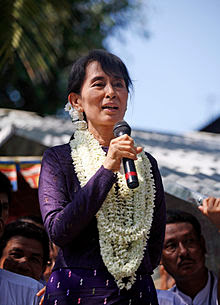Aung San Suu Kyi’s 2012 Visit To The US: An Assessment
By IPCS
By Nayantara Shaunik
The recently concluded 17-day tour of Aung San Suu Kyi to the US spurred much debate on the political environment of Myanmar, its leadership and, scope for a stable future. In her various appearances across the nation between 16 September 2012 and 3 October 2012, Aung San Suu Kyi addressed several key issues, essentially reaffirming Myanmar’s commitment to democracy. This along with the concurrent visit of Myanmar’s President, Thein Sein, to attend the 67th UN General Assembly in New York has helped highlight a positive turn in US-Myanmar relations. However, her reticence in answering certain critical questions concerning Myanmar has left many disappointed.
Issues Addressed

Throughout the tour, Aung San Suu Kyi hailed Myanmar’s focus on reforms instituted by President Sein. She lauded the release of hundreds of political prisoners earlier this year whilst adding that the process must continue till all such detainees are released.
Modifying her stance on “ethical and measured investment”, Aung San Suu Kyi emphatically announced that the time has come for the gradual lifting of all remaining US-imposed economic sanctions; with Myanmar having proved its readiness to remain assiduous to the path of democratic reforms.
Finally and perhaps most significantly, she addressed the idea of democracy and its implications for the country. Whilst remaining firm with respect to the country’s imminent democratisation, she emphasised that the form it takes need not necessarily replicate a democratic model easily recognised by the West. At the same time, however, she rejected any ‘disciplined democracy’ as advocated by the military regime.
US-Myanmar Relations
Aung San Suu Kyi’s endorsement of Myanmar’s commitment to reforms led to US President Barack Obama signing a bill on 5 October 2012 which effectively allows the US to easily back International Financial Institutions (IFIs) that support Myanmar’s reform drive. US Secretary of State, Hillary Clinton, subsequently assured President Sein in New York that in recognition of Myanmar’s progress, the US would move towards easing restrictions on imports of Myanmarese goods into the US – effectively, another step towards improving commercial relations between the nations.
However, the fate of Myanmar’s nascent political reforms rests heavily on the relationship between Aung San Suu Kyi and President Sein. A breakdown in cooperation between the two could be lethal to Myanmar’s fragile transformation which has been viewed as reversible until the army completely submits to change. Bearing this in mind, the recent visits of both statespersons were diplomatically balanced to ensure that the NLD leader would not completely overshadow the President – whilst Aung San Suu Kyi was showered with praise, the former General was hailed for implementing the current course of reforms. On balance, the visits of both statespersons have been a success for US-Myanmar relations.
Although some may consider it too early for speculation, the idea of a US pivot to Asia could gain immense traction by enhancing engagement with a nation considered the bridge between South and Southeast Asia. Many also saw Aung San Suu Kyi’s visit as a chance for the Obama administration to add another feather to its cap of foreign policy accomplishments ahead of the impending general elections in November. One thing however, is clear – by increasing engagement and pushing for democratic reforms, the US is vying for closer ties with Myanmar insofar as this enhances its visibility in the region.
Enduring Disappointment
Answering a question raised at several events about the numerous atrocities committed by the military on the ethnic Kachin minority, Aung San Suu Kyi firmly refused to term these as human rights violations. She further stated that, “resolving conflict is not about condemnation, it is about finding out the root, the cause of the conflict”. This has drawn flak from the international community as well as the Myanmar ethnic minorities, including diaspora settled abroad since her rhetoric has a nuanced contradiction when it comes to actual implementation.
Although remaining diplomatically neutral is essential in pursuing long-term post-conflict reconciliation processes, Aung San Suu Kyi in her attempt to not take sides has been viewed to favour the military nonetheless. Her consistent backing of them has only added to this perspective of the Myanmarese ethnic minorities. At an event in Queens College, New York on 22 September 2012, she announced that she would condemn any human rights violations against the Kachin minority if there were proof of the same and yet, failed to do so. While Aung San Suu Kyi’s supporters argue that this pseudo-appeasement strategy is to ensure the Generals do not get antagonized; her inaction insofar as confronting them is concerned, has irritated the ethnic minorities who believe that ‘to remain silent is to empower the military.’
“Suu Kyi is trying to play politics, and she is making a fatal mistake”
– Roland Watson, Founder, Dictator Watch
Aung San Suu Kyi runs the risk of creating further resentment amongst the minorities thence alienating them from the reformation process if she fails to stand by the ideals she has claimed to espouse so far. It is critical however, to emphasize here that, Aung San Suu Kyi is only a leader of opposition and therefore is only a part of the reform process initiated by the government. In that sense then, her visit to the US and its consequences, are a step in the right direction although there is a long road ahead that has yet to be traversed.
Nayantara Shaunik
Research Intern, SEARP, IPCS
email: [email protected]
